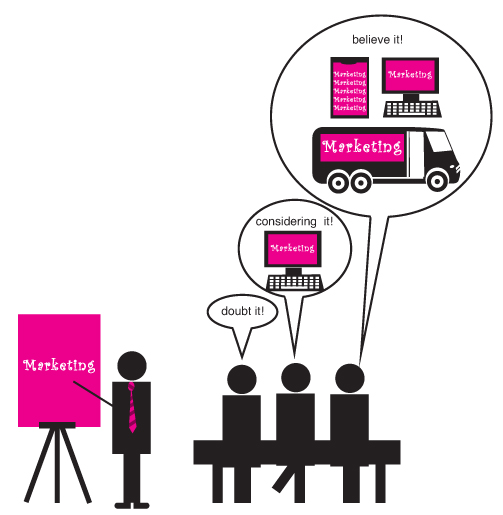Let me repeat myself: How marketing repetition makes a believer out of your customers
 Why do you believe what you hear is the truth? Especially in
marketing, why do you believe some marketing claims to be 100 percent truthful
when you may have never had any interaction with the brand other than being
touched by its marketing? We tend to believe what we hear repetitiously.
Why do you believe what you hear is the truth? Especially in
marketing, why do you believe some marketing claims to be 100 percent truthful
when you may have never had any interaction with the brand other than being
touched by its marketing? We tend to believe what we hear repetitiously.
Have you ever heard of the illusory truth effect? This is
the theory that the more you hear something, the more you will believe it is
true, even if you previously believed it to be untrue. Back in 1977,
researchers at Temple and Villanova did an experiment with a group of people.
They gave these subjects a list of sixty bits of trivia and asked them to mark
them either true or false statements. Two weeks later, they gave them a new
list and asked them to again rate them as true or false. Of the sixty
statements on the second list, twenty of them were the same as the first list.
Two weeks later, a third list was given to the same people. Again, it contained
sixty statements and the same twenty statements from the first list were
repeated. What they discovered was more people found the twenty repeated
statements to be true by the third round. The more they saw them, the more they
believed them, even if they had marked them as false in the first round. The
study concluded that people can be conditioned to believe nearly anything if
they hear it repetitiously.
The marketing impact of the illusory truth effect is quite
powerful. You may have heard of the famous marketing Rule of Seven. That
suggests you have to hear something repeated seven times before you remember
it. That is why you can listen to a 30 second spot and hear the brand repeated
seven times before the ad is complete. Repetition has always been used for
recall; but remembering a fact is one thing, believing it is another.
Advertising frequency is equal to brand credibility if you follow the research.
Of course, this only works if you are backing up your
marketing claims. Just as your marketing is believed by the repetition, so is a
disgruntled customer. Here is the backswing of it all: if you oversell and
under-produce, your reputation will take a beating. The more people hear it,
the more they believe it to be true. Even if a satisfied customer had a great
experience with your brand, hearing someone who had a bad experience time and
again will cause them to change their mind about you. Don’t forget that
marketing is a reputation business.
You may think this is an absurd bit of research. You
certainly cannot make people believe a lie by just repeating it over and over
again, can you? Let me say that there have been several studies done on the
illusory truth effect over the years since it was first introduced. Every study
I have read tends to back up the original research. However, if you want a
practical application of the theory at work, all you have to do is look at the
trending news of the day. You will find all kinds of stories that are half
baked at best - total falsehoods in many cases – and people read them, comment
on them, share them, and believe them. There is a reason fake news is so
pervasive. When we hear something time and again, we tend to believe it.
Politicians, social media tycoons, news media executives and thought leaders of
every stripe use this as a means of persuasion for one reason: it works!
How repetitious is your
marketing message? Do you have a catchy campaign slogan, a branded tagline that
helps separate you from your competition, key sales points that help you take
your best foot forward with the customer? How many places are you repeating
this message? If you want your marketing claims to be memorable and believable,
you need to use it repetitiously. However, don’t forget the customer service
side of marketing either. Resolve problems quickly. People believe what they
hear repeated time and again. Make sure your good reputation is what is
repeated.